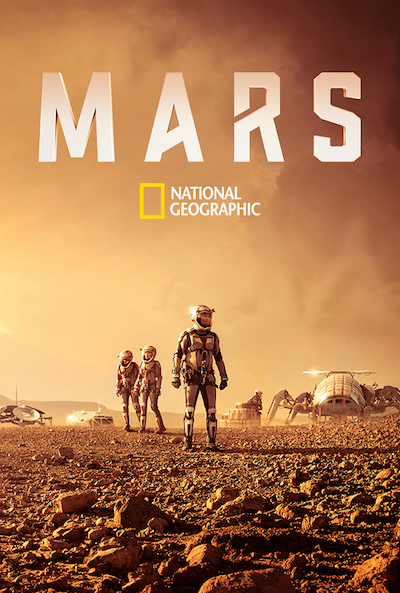IMDb meta-data is this 13 one-hour episodes rated 7.5 from 7501 cinemitizens
Verdict: Excellent and a relief after the sappy hyperbole of ‘Mission to Mars’ (2000), reviewed elsewhere on this blog. But it bogs down, running out of story while the camera goes on and on.

A docudrama about the first Mars landing in 2033 interspersed with 2016 talking heads describing the technical, scientific, and human problems that have to be surmounted to get there. These details are larded with some elevated rhetoric about the purpose in going to Mars.
Purpose? ‘Because it is there,’ that is the distillation of that rhetoric. We see twice the same clip from Jack’s speech in Houston about it being hard, as a justification for the commitment. (I stood at that podium in 2018.) He and Edmund Hilary have a lot to answer for. On this point there will be more below.
Still it was refreshing to hear the optimism and determination from the enthusiasts like Elon Musk who are trying to make it happen. Happily Richard Branson did not put in an appearance to steal the scene with his look-at-me camera mannerisms. Though NASA is represented among the talkers, one theme is that private enterprise can go where no government is willing to go. That would seem pertinent now since the current NASA Administer-nominee wants to eliminate from its charter ‘the expansion of human knowledge’ because God does not like that.
In later episodes I learned that the early Moon missions were trials for Mars in the minds of the NASA scientists and others. Moon was a stepping stone to Mars. That is much emphasised, and it completely escaped me at the time when the Moon seemed enough. However, though it is passed in silence in this telling, Moon was the strategic goal for the military, whose role in space is omitted. Yet those rockets belonged to the US Air Force. There was certainly much popular speculation that near space or Moon would offer an invulnerable missile platform.
As the talking heads lay out how it would go, we cut to a dramatic sequences where it is acted out. In reality, no vampires, zombies, meteors, cave women, enlarged spiders, hostile natives, or man eating daisies are needed to make a mission to Mars deadly. (These possibilities have all been covered in the Mars filmography on this blog.) There are many things that can go wrong, and inevitably some of them will.
Gravity kills. Elemental that. The first death is a fall. A lung is punctuated by a broken rib. Nothing can be done and….
The fall occurs because a fuse blew upon entering the Martian atmosphere and while Captain was replacing it the planet’s gravity clicked in and he fell. Bang.
Because the fuse was not replaced they land a long way for the base camp that had been prepared by robots. To get there, they will have to walk with the dying captain.

Can they walk 75 kilometres before the oxygen in their backpacks runs out? And before the fraternity get bored?
We have a polyglot crew, and also interspersed are fictional pre-flight interviews with them. The point is I guess to indicate what kind of person signs on for this and perhaps to inspire such persons. To me, these were insipid but perhaps my jaded ear was listening.
One of the sticking points from all the talking heads is a double whammy. Everything done on approaching Mars will be done for the first time. No amount of testing. No simulations. No nothing is a Mars test. Mars tests have to be done on Mars.
Moreover, for everything there is only shot. Miss and that’s it. Either you die or return to Earth. If the window of landing is missed it is back to Earth. If the ship hits the atmosphere at the wrong angle, it burns on descent, or crashes on landing, or misses the site by kilometers, or worse, and spins off into space.
I liked the realism. I liked the honesty that things will go wrong. I liked it that the struggle to walk is plainly a struggle, and so on.
Because it was not a military operation, the chain of command was unclear to me. I said ‘Captain’ above but the term is not used.
Later there is an explanation for the failure to continue with Moon. Again it passed me by at the time. the near failure of Apollo XIII caused the Nixon administration and Congress to think twice. No one wanted the public responsibility of a mortal failure. The compromise result was to concentrate on near space with the shuttles. The irony is that deaths occurred, and the Reagan administration did what others did not have the conviction to do, go on.
However by episode six I found it repetitive and boring. On Mars we see much trudge and toil without sufficient explanation of purpose. Are they doing science? Preparing for colonisation? Waiting for the next catastrophe? Looking for new script pages? There is a lot of marking time, leaving the actors little to do.
The death of the botanist was a missed opportunity to this viewer. It just seemed too pat and almost a photocopy of the death of Captain earlier, walking into the light. What killed him was the ten-week dust storm and that was not brought home. Instead it seemed he just went stir crazy. If so, it was some selection process that yielded him for the job. Others were killed in that incident but only the botanist is mourned.
The 2033+ segments divide between the crew on Mars and head offices in London and Vienna. (No idea why two except to offer different cityscapes.) The latter seems pointless. Much posturing. It does allow one of the players a dual role. BFD. There seems to be the usual back biting and bickering, but it adds nothing to the focus: Mars. Nor is the office politics well realised. Most of these episodes are board meetings where twelve extras sit silently. One images the members of the board are as bored as the viewer.
The 2037 press conference seemed silly. The vultures of the press are seated in an orderly manner, already unrealistic, meters away from the podium. Why? So that when the revelation is announced they can be viewed from above swarming the podium like the amoeba in an earlier microscope image. It looks staged because it is. It seems heavy-handed because it is.
Only a few so-called critics’ reviews are attached its entry on the IMDb, and none of these is from a significant media source like the ‘New York Times.’ Nor are any from the Sy Fyians who cover the fictional accounts of Mars. Finally there are only a half dozen of them, which is a small number for a recent release. Odd. I did find the NYT review which is lukewarm for the kinds of reasons given here.
In addition, the IMDb critics are mostly negative. Some complain that it is neither fish nor fowl. Neither is it a sustained documentary, nor a fiction. Yep that is right but it is also irrelevant since it sets out to dramatise some of the points made in the documentary. This criticism is like saying Impressionist painting is too colourful. That is the point.
Others fault the acting. Huh. I thought the acting was fine. Though the players are all unknown to me, they seemed to fit the roles they had. They were young. They were stupid brave. As I read this criticism it dawned on me that the writers perhaps wanted a Hollywood name. Not me when I recalled the acting I have seen in Mars films from Hollywood names, mugging, soulful pouting, gung-ho nonsense, selfie sticking, and the like. Whereas I concluded the use of unknowns was a good choice to place emphasis on the mission rather than on the personalities, and the pre-conceptions audiences bring to Hollywood names.
I say ‘unknowns’ to admit my ignorance, not to denigrate the players.
But I would say on further viewing that the script gives the players little to do after the first four episodes.
The Jordanian Tourist Board got pipped on this one. The Mars outdoors scenes were filmed in Morocco. Seems appropriate since Moroccan leather binding on books is always red. To judge from the extensive terminal credits most of it was processed in that capital of cinema, Hungary. I noticed in the credits a ‘Data Wrangler.’ But by episode six there was a Data Wrangler, a First Assistant Data Wrangler, and — guess! — a Second Assistant Data Wrangler. It runs to twelve parts in all so what can we expect for this entry at the end?
Skip to content
